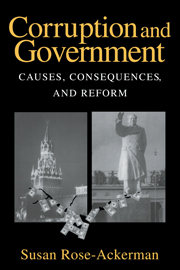Book contents
- Frontmatter
- Contents
- Preface
- 1 Introduction: The Costs of Corruption
- Part I Corruption as an Economic Problem
- 2 The Economic Impact of Corruption
- 3 Corruption of High-Level Officials
- 4 Reducing Incentives and Increasing Costs
- 5 Reform of the Civil Service
- Part II Corruption as a Cultural Problem
- Part III Corruption as a Political Problem
- Part IV Achieving Reform
- References
- Name Index
- Subject Index
5 - Reform of the Civil Service
Published online by Cambridge University Press: 05 June 2012
- Frontmatter
- Contents
- Preface
- 1 Introduction: The Costs of Corruption
- Part I Corruption as an Economic Problem
- 2 The Economic Impact of Corruption
- 3 Corruption of High-Level Officials
- 4 Reducing Incentives and Increasing Costs
- 5 Reform of the Civil Service
- Part II Corruption as a Cultural Problem
- Part III Corruption as a Political Problem
- Part IV Achieving Reform
- References
- Name Index
- Subject Index
Summary
A personnel system based on patronage and political loyalty undermines the efficient delivery of services and leads to the unfair administration of tax and regulatory laws. If corruption and self-dealing are imbedded in a government that is otherwise democratizing and downsizing, this can delegitimize political and economic reform. The goal is not to isolate public administration completely from politics – an impossible task in any event – but to find ways to mediate the relationship. Traditionally, a professional civil service is politically neutral, has security of tenure, is paid a decent salary, is recruited and promoted on merit, and does not have property or business interests that conflict with the fair performance of its duties (Adamolekun 1993). Some present-day reformers question aspects of this traditional model, but even they support the principle that civil servants should not be hired and fired for political reasons (Reid and Scott 1994; Scott 1996).
Countries emerging from a period of one-party or authoritarian rule face the challenge of creating a professional civil service. The executive branch needs to be politically accountable, but it also must perform day-to-day tasks with a minimum of corruption and favoritism. In Mexico, for example, as the long history of one-party dominance weakens, the national government is considering the establishment of a professional civil service (Guerro Amparán 1998). A democracy where parties alternate in power does not appear compatible with a public employment system based on political patronage.
- Type
- Chapter
- Information
- Corruption and GovernmentCauses, Consequences, and Reform, pp. 69 - 88Publisher: Cambridge University PressPrint publication year: 1999



